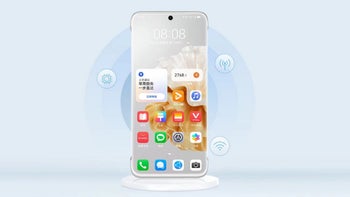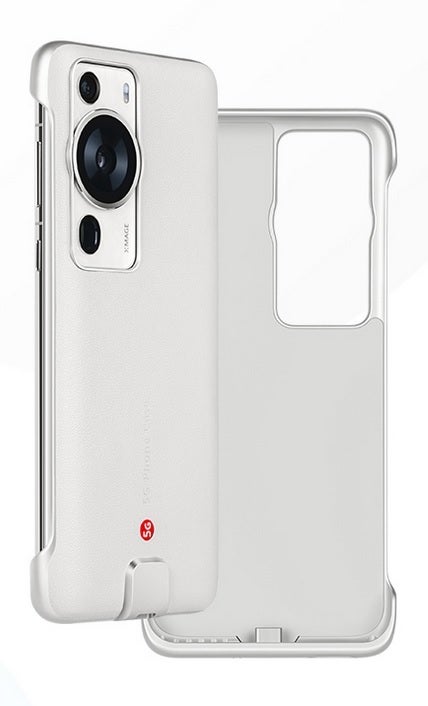This accessory will allow your Huawei P60 and P60 Pro to have 5G connectivity

If you've been following the Huawei saga, you know that U.S. export rules prevent any foundry using American technology to send cutting-edge chips to Huawei. This even goes for chips designed by Huawei's own HiSilicon semiconductor unit. China's foundries, including the country's largest (SMIC), are banned from obtaining the equipment they need to manufacture chips that rival those churned out by TSMC and Samsung Foundry.
How you can access 5G networks on your Huawei P60 and P60 Pro
Huawei has been able to source Qualcomm Snapdragon chips with one major proviso: the chips are modified so they do not work with 5G signals. But there is a way for Huawei P60 and P60 Pro users to obtain a 5G connection. Chinese case manufacturer Soyealink (via Gizchina) is offering cases for the P60 line that will not only protect your P60 series handset, they will also allow the device to connect to a standalone or a non-standalone 5G network.

This Soyealink case will add 5G connectivity to your Huawei P60 and P60 Pro
A standalone (SA) 5G network is one built with a 5G core and delivers faster data speeds. A non-standalone (NSA) 5G network is one where 5G infrastructure has been built over a core 4G network. The latter has been used as a way as a way for carriers to quickly (and more cheaply) offer 5G to subscribers. In the U.S., for example, only T-Mobile has completed a 5G SA network and Dish Wireless is building one. The case supports sub-6GHz 5G networks.
The actual bands supported by the case include:
NSA: B3+N41, B3+N78, B3+N79, B1+N78, B1+N41, B39+N41, B39+N79, B41+N79, B5+N78, B8+N78
SA: N1, N3, N28, N41, N77, N78, N79
SA: N1, N3, N28, N41, N77, N78, N79
With the case installed on your P60 or P60 Pro, you'll be able to manage your 5G connectivity using an on-screen tool found on your phone. This tool will allow you to check all of the 5G networks in your area and switch to a better network if possible. The case uses eSIM (embedded SIM) to work. An eSIM is a dedicated chip that is mounted to the phone's motherboard and replaces a physical SIM card. You'll need to have an active eSIM on your phone through as wireless carrier.
Putting the case on your P60 series handset will start the process of connecting your phone to a 5G network; simply follow the directions using the setup wizard. The P60 line was introduced last month.
The P60 Pro features a 6.67-inch AMOLED display with a 1220 x 2700 resolution and a 120Hz refresh rate. The Snapdragon 8+ Gen 1 SoC is under the hood although the 4nm chipset is modified to not support 5G connectivity (without the Soyealink case). The device is equipped with LPDDR5X RAM and buyers can choose between 256GB and 512GB of storage.
Both Huawei P60 models will allow messaging via satellites when cellular service is not available
On the back, you'll find a 48MP wide camera with variable aperture (f/1.4-f/4.0), a 48MP telephoto camera delivering an optical zoom of 3.5x, and 100x digital zoom. Also part of the rear camera array is a 13MP ultrawide camera. A 13MP front-facing camera handles selfies and video chats. In China only, the P60 line will hook up with a satellite to allow messaging in areas where there is no cellular network. This feature will allow text messages to be sent and received using Beidou satellites.
Keeping the lights on is a 4815mAh battery that charges at 88W for wired charging and 50W for wireless charging. The device has an IP68 rating for dust and water protection and is available in Feather Purple, Feather Black, Emerald Emerald, and a limited Rococo White. HarmonyOS 3.1 is pre-installed. The P60 Pro starts at CNY 6,988 for the model with 256GB of storage and the 512GB variant will run you CNY 7,988.
Much of the difference between the P60 Pro and the P60 is with the rear camera setup. The P60 replaces the 48MP telephoto sensor on the P60 Pro with a 12MP sensor. Huawei is expected to release an international version of the phones for the U.K. and other markets.
Huawei is reportedly planning to release the Mate 60 flagship series later this year. While the P series is focused on photography, the Mate line has the latest innovations , technology, and features.










Things that are NOT allowed: